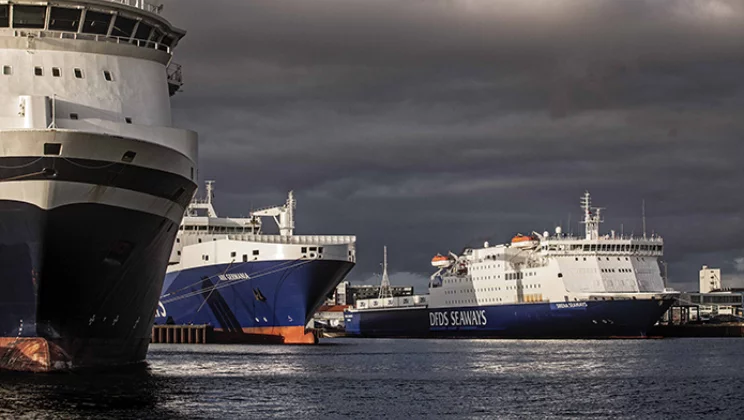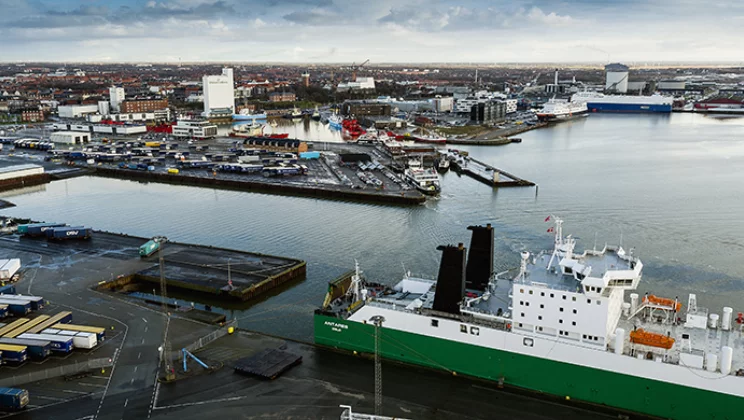A new framework act for Denmark's ports aimed at providing a level playing field and competitive terms for the offshore industry. Those are two of the main recommendations from the Maritime Strategy Team, according to the Team’s chairman, Jesper Lok, and Ole Ingrisch, Port Director for the Port of Esbjerg. They both expect to see political action taken on the recommendations.
In April of this year, the Maritime Strategy Team presented eleven main recommendations and 52 secondary recommendations intended to promote growth for Blue Denmark. The report was written by a ten-man working group appointed last year.
High-profile reports full of good ideas are not always followed by action, but two of the authors are very confident that this one will be different.
“Blue Denmark is an industry with about 100,000 jobs. It accounts for 25% of Danish exports, so I’m sure the Danish parliament will listen to us,” as Mr Ingrisch puts it.
He is Port Director at Esbjerg, chairman of Danish Ports and a member of the Maritime Strategy Team.
The chairman of the Team, Jesper Lok, adds: “The report was very well received, and I also expect action to be taken on our recommendations.” Mr Lok is also group CEO for facilities management provider Alliance+, as well as chairman of food wholesaler Dagrofa and shipping companies J. Lauritzen and Esvagt.
Overall, the Maritime Strategy Team has been focused on safeguarding Denmark’s position as a leading maritime nation by attracting and retaining tonnage and new shipping operators. The intention is also to retain Denmark’s leading position as a global provider of maritime products and solutions.

Key recommendations
Of particular importance to Mr Ingrisch are the framework conditions applying to Danish ports. Among the recommendations made is implementing a new port act that would ensure terms allowing Danish ports to be competitive with other international ports. Under the current act, some ports have access to tax payer-guaranteed capital while others do not.
“We need to modernise and standardise the system,” says Mr Ingrisch.
There was broad agreement on the Team that legislation ought to be updated, and preparations are in fact already underway.
The Team recommends that all vessels become subject to the DIS tax scheme, which would ease the cost burden. It would also add to Denmark’s competitive strength by giving seafarers a net pay scheme so they would not be taxed in Denmark.
Mr Lok believes that the offshore industry should be given a competitive framework that would reflect the dynamic developments currently seen for offshore wind.
“For example, we should also ensure a competitive framework for the highly skilled maritime technicians working for Danish maritime equipment manufacturers all over the world.”
This would make Danish businesses more competitive in international markets.
R&D in focus
There was a great deal of support across the highly diversified Maritime Strategy Team for emphasising R&D.
This team consensus was not least rooted in the fact that not all parts of the offshore industry have felt the effects of the digital revolution yet.
“In fact, our industry has fallen behind,” says Mr Ingrisch.
As an example, he notes that road carriers can cross borders without having to declare their cargo, whereas sea carriers are governed by much more complex rules.
“All the documents that must be filled in on arrival and departure should be digitalised in a secure way. That would make a huge difference in our everyday operations,” he says.
Mr Ingrisch also mentions drone technology, unmanned vessels and systematic use of big data as examples of how digitalisation could make a huge difference.
“This is something that will snowball very quickly. It is essential that the sector be prepared, and that’s where training and research comes in,” he says.

Thirty trillion dollars
In a 2016 report entitled The Ocean Economy, the OECD estimates that the ocean economy could potentially contribute as much as 30 trillion dollars to the global economy, a figure twice as high as in 2010.
Mr Lok believes Denmark is well positioned for the projected strong growth that the recommendations of the Maritime Strategy Team could perhaps help to materialise.
“Denmark is in a strong position. We’re already a major maritime force: we have some of the world’s most skilled maritime traders, and we are leaders in the offshore wind industry. That gives us an excellent opportunity to capitalise on the potential the OECD is highlighting,” says Mr Lok.
He believes the Port of Esbjerg is a good example of the diversity of maritime skills in Denmark.
“I’m confident that the private sector entrepreneurs who have helped to drive the strong developments at Esbjerg will also have strong global positions when offshore wind becomes reality in new geographies,” says Mr Lok.
He believes that many of the Team’s recommendations will be followed, but he is not going to just lean back and wait for it to happen.
“We will continue to monitor developments and will take stock of them in a year’s time.”
Go to overview

